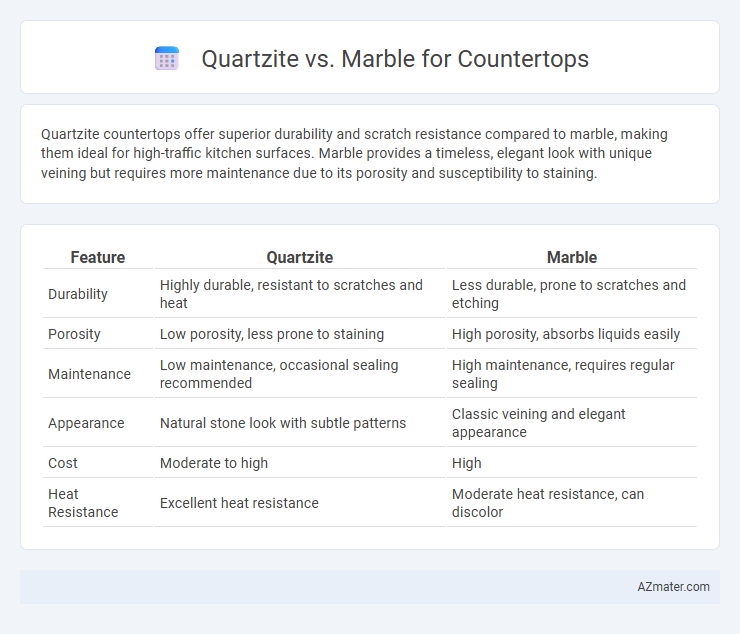Quartzite countertops offer superior durability and scratch resistance compared to marble, making them ideal for high-traffic kitchen surfaces. Marble provides a timeless, elegant look with unique veining but requires more maintenance due to its porosity and susceptibility to staining.
Table of Comparison
| Feature | Quartzite | Marble |
|---|---|---|
| Durability | Highly durable, resistant to scratches and heat | Less durable, prone to scratches and etching |
| Porosity | Low porosity, less prone to staining | High porosity, absorbs liquids easily |
| Maintenance | Low maintenance, occasional sealing recommended | High maintenance, requires regular sealing |
| Appearance | Natural stone look with subtle patterns | Classic veining and elegant appearance |
| Cost | Moderate to high | High |
| Heat Resistance | Excellent heat resistance | Moderate heat resistance, can discolor |
Introduction to Quartzite and Marble Countertops
Quartzite countertops are composed of natural metamorphic rock, renowned for their exceptional hardness, durability, and resistance to heat and scratching, making them ideal for high-traffic kitchen surfaces. Marble countertops, formed from recrystallized carbonate minerals, offer unique veining patterns and a luxurious aesthetic but are softer and more porous, requiring regular sealing and careful maintenance to prevent staining. Both materials provide distinct elegance and functionality, with quartzite excelling in resilience and marble favored for its classic beauty.
Composition and Natural Formation
Quartzite, composed primarily of quartz grains fused by natural heat and pressure, forms through the metamorphism of sandstone, resulting in a highly durable and dense stone ideal for countertops. Marble, originating from the metamorphism of limestone, consists mainly of calcite crystals, giving it a softer structure with distinctive veining but less resistance to scratches and heat compared to quartzite. The crystalline structure and mineral composition of quartzite provide superior hardness and longevity, while marble's carbonate composition offers unique aesthetic appeal but requires more maintenance.
Visual Appeal and Color Variations
Quartzite countertops showcase a natural, glassy finish with subtle veining and a wide spectrum of earth tones, ranging from white and gray to warm beige and pink hues, delivering a sleek, modern aesthetic. Marble offers classic elegance with its distinctive, bold veining patterns and a luminous surface, commonly found in shades of white, black, and green, providing timeless sophistication. Both materials enhance visual appeal through unique color variations, but quartzite tends to present a more consistent yet durable look while marble reveals dramatic contrasts that evolve with age.
Durability and Hardness Comparison
Quartzite exhibits superior durability and hardness compared to marble, with a Mohs hardness rating of 7, making it highly resistant to scratches and heat. Marble, with a lower Mohs rating of around 3-5, is softer and more prone to etching and staining from acidic substances. Quartzite's robust composition makes it an ideal choice for high-traffic kitchen countertops that demand long-lasting performance.
Maintenance Requirements: Quartzite vs Marble
Quartzite countertops require minimal maintenance, needing only periodic sealing to prevent stains and scratches due to their dense and durable nature. Marble countertops demand more frequent sealing and careful cleaning to protect against etching and staining from acids and oils. Quartzite is generally more resistant to wear, making it a more practical choice for homeowners seeking low-maintenance surfaces.
Stain and Scratch Resistance
Quartzite countertops exhibit superior stain and scratch resistance due to their natural hardness, making them ideal for high-traffic kitchen environments. Marble, while luxurious and visually appealing, is more susceptible to staining from acidic substances and scratching from everyday use, necessitating frequent sealing and careful maintenance. Choosing quartzite ensures durability and ease of upkeep, preserving countertop aesthetics over time in comparison to marble.
Heat and Chemical Resistance
Quartzite offers superior heat resistance compared to marble, making it ideal for kitchen countertops exposed to hot pots and pans. Its natural composition also provides enhanced chemical resistance, reducing the risk of etching or staining from acidic substances commonly found in household cleaners and food. Marble, while elegant, is more porous and susceptible to damage from heat and chemicals, requiring careful maintenance to preserve its surface.
Cost Differences and Budget Considerations
Quartzite countertops typically cost between $50 and $150 per square foot, making them more affordable than high-end marble, which ranges from $75 to $250 per square foot. Marble's higher price reflects its luxurious appearance and softer composition, requiring more maintenance and careful handling. Budget considerations should factor in not only initial installation costs but also long-term upkeep expenses, as quartzite offers greater durability and lower maintenance compared to marble.
Pros and Cons of Quartzite Countertops
Quartzite countertops offer exceptional hardness and durability, making them highly resistant to scratches and heat, which is ideal for kitchen use. They feature a natural, unique veining pattern that closely resembles marble, providing aesthetic appeal with better stain resistance and less maintenance. However, quartzite is more prone to etching from acidic substances compared to engineered stones, and it requires periodic sealing to maintain its appearance and prevent staining.
Pros and Cons of Marble Countertops
Marble countertops offer unmatched elegance and a unique, natural pattern that enhances kitchen aesthetics, but they are prone to scratching and staining due to their porous nature. Their heat resistance is beneficial for cooking areas, yet they require regular sealing and maintenance to prevent etching from acidic substances. Despite their luxurious appeal, marble countertops may not be ideal for high-traffic kitchens because of their softness compared to harder stones like quartzite.

Infographic: Quartzite vs Marble for Countertop
 azmater.com
azmater.com